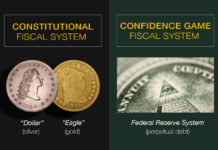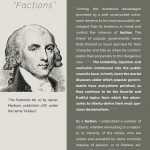“Legal Tender Law”: Opting Out
"Legal Tender Law": Opting OutIt is the general consensus among economists that the "Legal Tender Law" (Title 12 of The United States Code, Section...
The Monetary Powers and Disabilities in the Pre-Constitutional Period
As a Rule of Constitutional Construction:
The first step towards elucidating the true meaning of the Constitution’s monetary provisions is not to consult decisions of...
The Civil War and “Bills of Credit”
The Civil War and “Bills of Credit”“The immediate aftermath of the Civil War was a time of unprecedented legal flux, during which new doctrines...
“To regulate Value”
“To * * * regulate * * * Value ” and the cognate power “To * * * fix the standard of Weights and...
“To coin Money”
The power “To coin Money”Article I, Section 8, Clause 5 sets out the sole, express grant of power in the Constitution to bring "Money"...
Adoption of the “Dollar” as the “Money Unit” Prior to the Ratification of the...
The Constitutional "Dollar"Both Article 1, Section 9, Clause 1 and the Seventh Amendment to the Constitution refer explicitly to the “dollar”—in the one case,...
Federal Reserve System: Cartel Structure
The Federal Reserve SystemThe Federal Reserve System is a cartel that controls the United States money supply and redistributes wealth with the blessings of...
The Power to Declare “Money” a Legal Tender
The following analysis is an excerpt fromTO REGULATE THE VALUE OF MONEY:AN ANALYSIS OF THE POWER OF GOVERNMENT TO CREATE AND SET A VALUE ON...
Constitutional vs. Confidence Game Fiscal System
1.) Silver and Gold as Money is constitutionally required for Economic "Homeland Security"
Historically, silver and gold have always proven to be the best...
“Bills of Credit”: Outlawed by the Constitution
"Bills of Credit": Outlawed by the ConstitutionIn the the Federal Convention of 1787, the initial draft of the Constitution reported by the Committee of...







































